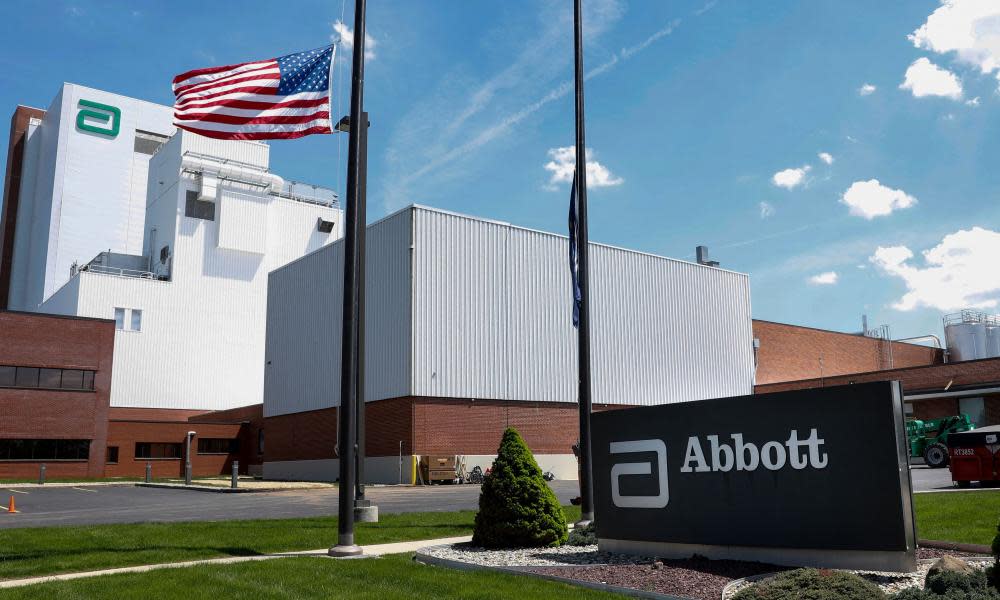Baby formula crisis: Abbott enriched shareholders as factory needed repairs, records show

A deadly bacteria outbreak in baby formula and an ongoing formula shortage stem from issues some economists characterize as “rot” in the nation’s economic system: prioritization of shareholder wealth and consolidation.
The embattled baby formula producer Abbott used windfall profits to enrich investors instead of replacing failing equipment that was likely injecting the dangerous bacteria into its infant nutritional products, financial records and whistleblower documents show.
Related: More than 3,000 potentially harmful chemicals found in food packaging
Abbott detected bacteria eight times as its net profits soared by 94% between 2019 and 2021. And just as its tainted formula allegedly began sickening a number of babies, with two deaths reported, the company increased dividends to shareholders by over 25% while announcing a stock buyback program worth $5bn.
“Abbott chose to prioritize shareholders by issuing billions of dollars in stock buybacks instead of making productive investments,” said Rakeen Mabud, chief economist for the Groundwork Collaborative, a progressive economic advocacy group. “It’s important that we have high standards for something as vital as baby formula.”
Abbott denies share buybacks hurt safety but the controversy has some economists calling for stricter anti-trust enforcement, bans on buybacks and limits on dividends.
The tainted product triggered a February recall of three popular Abbott infant formulas, including Similac, when batches likely tainted with the rare Cronobacter bacteria killed two infants and sickened two more. The FDA and CDC reported the babies “consumed formula produced at the Sturgis, Michigan” facility before they got sick, and the bacteria “may have contributed” to their deaths.
Abbott halted production at the Sturgis plant, the nation’s largest, but the company has since downplayed the controversy and claimed “there is no evidence to link our formulas to these infant illnesses”. Federal investigators said it was not clear either way. “Right from the get-go we were limited in our ability to determine with a causal link whether the product was linked to these four cases, because we only had sequences on two,” FDA’s food director Susan Mayne said in a media briefing on Monday, ABC News reported.
Regardless, the operation remains paused, and the deep cut into the nation’s formula supply is partly a result of consolidation: Abbott and three other companies control nearly 90% of the market, Mabud said, and Abbott alone makes 43% of US formula.
“When Abbott halted production that whole market was disrupted, and the result was desperate parents around the country couldn’t feed their babies,” Mabud added. “We don’t have a resilient supply chain, not for baby formula and not for a whole host of other goods.”
In the two years ahead of the recall, Abbott’s net profits jumped from $3.6bn to $7.1bn, its operating margins improved, and revenue in the US pediatric nutritional division increased by about 16%, Securities and Exchange Commission filings show. Company executives in earnings calls attributed the new pediatric nutritional revenue to market share gains and price increases, while covid tests were a boon to the parent company.
The federal whistleblower complaint alleged some of the Sturgis plant’s equipment that caused the bacteria to get in the product “was failing and in need of repair”, and company management was aware of the issue for up to seven years ahead of the outbreak.
“A number of product flow pipes were pitting and leaving pinholes. This allowed bacteria to enter the system and, at times, led to bacteria not being adequately cleaned out in clean-in-place washes,” the report reads. “This, in turn, caused product flowing through the pipes to pick up the bacteria that was trapped in the defective areas of the pipe.”
The problems are not limited to ageing equipment, according to the whistleblower. Management at the plant also falsified records, improperly trained employees, and successfully hid health and safety risks from the Food and Drug Administration auditors in 2019.
Companies like Abbott are “using every product as a personal ATM” by cutting corners to maximize profits, said Moe Tkacik, a senior fellow at the American Economic Liberties Project.
In the short term, Joe Biden has invoked the Defense Production Act to speed production of infant formula and authorized flights to import supply from overseas, while the FDA approved a deal with Abbott to bring the Sturgis plant back online within several weeks.
But long-term solutions will require more bold steps, Tkacik said, like a ban on buybacks and restrictions on dividends. She acknowledged such ideas are dismissed as “socialistic”, but noted buybacks were illegal until 1982 because they were considered a form of manipulation. Annual buyback program expenditures among S&P 500 companies are often exceeding research and development or other investment, Tkacik said.
Restrictions on dividends are reasonable for companies that receive federal funding or whose largest customers are federal programs, like Abbott, she added.
A spokesperson for Abbott said: “Stock buybacks are not impacting our ability to invest in or reopen our Sturgis manufacturing facility; in fact, our strong balance sheet has allowed us to invest in our facilities, including in Sturgis, and will help us make additional investments and more quickly restart the facility.”
The Senate Finance committee chair Ron Wyden on Wednesday requested information about Abbott’s stock buyback program.
Mabud said Congress and the president need to use the “wide array of policy tools that are on the table” to address consolidation, including breaking up companies when appropriate, empowering the FTC, taxing companies appropriately, and investing in diversification in consolidated industries.
“We need to make sure children can get the nutrients that they need – I think we can all agree on that – and these giant corporations … need to be held to account for the vulnerabilities that they’ve created and the quality of the product that they put on the market,” Mabud said.

 Yahoo Movies
Yahoo Movies 
